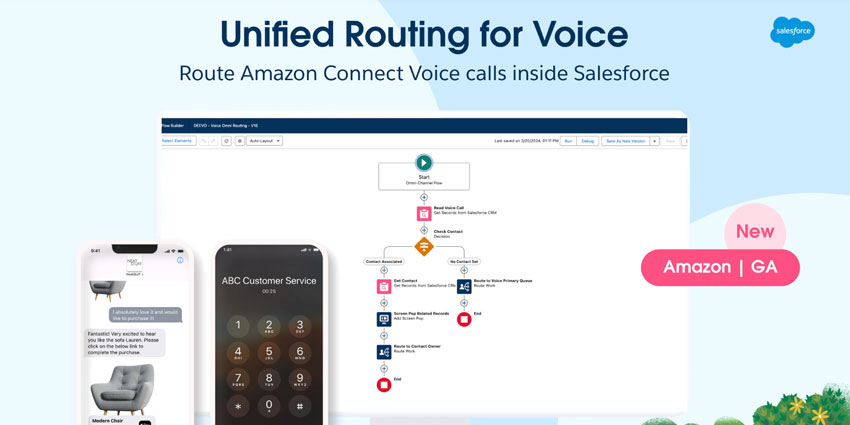Demand for flexible, innovative, and affordable open-source CRM software is increasing. By 2030, analysts predict this market will be worth a massive $5.94 billion, almost double its value in 2023. After all, in today’s age of digital transformation, agility is crucial.
Open-source CRM software allows business leaders in the contact center and CX landscapes to innovate and scale without restriction. Additionally, many of the best open-source CRM platforms offer smaller businesses and startups more affordable packages.
But what is open-source CRM software, what are its benefits, and how do you choose the right solution for your company in 2024? Here’s everything you need to know.
What is Open-Source CRM Software?
Open-Source CRM software, or “Customer Relationship Management” software, is a flexible solution that publicly makes source code from CRM technology available. This means you can manipulate the underlying code of your technology for customization purposes.
Like any open-source solution, open-source CRM technology makes developing and enhancing complex applications easier. All the heavy lifting required to build an effective solution for customer relationship management is already done. All you need to do is tweak the code for your specific purposes. Most vendors even offer access to libraries and documentation to help you.
Demand for this technology has grown in a world where companies want to implement more innovative capabilities, such as generative AI apps, into their CRM tools.
Open-Source CRM Software vs Proprietary Software
So, how does open-source software differ from proprietary CRM solutions? The answer is “flexibility”. While many market leaders in the CRM environment are making their tools more extensible with add-ons and integrations, proprietary software is still more restrictive.
When you purchase a proprietary CRM solution, there’s no assembly required. You simply choose the solution you want and configure it to your needs. An open-source CRM solution gives you granular control over source code and components.
Often, this is a popular choice for smaller organizations and companies with specific CRM needs. With open-source technology, creating a custom CRM is easier and less expensive.
The Pros and Cons of Open-Source CRM Software
CRM technology in all of its forms is crucial in today’s world. Studies show that CRM software can boost conversion rates by 300%, increase productivity by 34%, and boost sales by 29%. It does this by giving companies the power to track, manage, and optimize customer relationships.
Open-source CRM software delivers all of the standard benefits of a customer relationship management system and some extras. However, there are some potential downsides to taking the open-source route, too.
Pros of Open-Source CRM Software
- Affordability: Many open-source applications and platforms are either free or highly affordable. This makes the technology far more accessible for companies with limited budgets. However, you will need to pay for developer knowledge and support.
- Customization: Open-source code is meant to be tweaked and adjusted to suit your specific needs. Your team can take the code provided and transform it into whatever you need. This means you have complete freedom to build the ideal CRM experiences.
- Flexibility: While typical CRM vendors usually require licensing commitments, the same isn’t true for open-source technology. You can use the solutions you create and the code for as long as you like and switch vendors whenever you choose.
Cons of Open-Source CRM Software
- Limited support: While documentation and libraries may be available for some software, you won’t get as much support building your solution. You’ll need to source your development knowledge and expertise.
- Functionality: Although there aren’t many limitations on what you can do with open-source software, you might struggle to create advanced workflows without the proper support. You might not get the same functionality from a standard CRM provider.
- Security: Since you’re responsible for managing integrations and code changes yourself with open-source software, there are more risks to overcome. You might encounter more issues with protecting and preserving your CRM data.
What to Look for in an Open-Source Solution
Just as there are various steps involved in comparing and choosing traditional CRM providers, there are multiple factors to consider when selecting an open-source solution. Aside from deciding whether you want a free, open-source option or a paid solution, you’ll also need to think about the following:
- Ease of use: Simplicity is essential when choosing any CRM solution. The right open-source toolkit should quickly adapt and configure to your requirements. It should also offer a simple user interface for your everyday CX employees.
- Features: Different open-source CRM software types will come with unique features. Most will include tools for contact management and lead tracking. However, others will also include built-in code snippets for sales tracking, automation, and AI.
- Reporting and analytics: Reporting and analytical tools are essential for getting the most value from your CRM system. Your chosen system should offer insightful analytical and reporting tools for tracking customer journeys, sales performance, and more.
- Customization options: Open-source CRM software is naturally more flexible and customizable than proprietary solutions. However, some toolkits may be less suitable for advanced integrations and rapidly scaling businesses.
- Pricing: While some open-source CRM software is free, others will charge you for upgrades, developer support, and other solutions. Ensure the pricing provided by the company you work with is transparent and easy to understand.
It’s also worth taking a closer look at the solution’s approach to compliance and security. Look for pre-built encryption protocols to protect data at rest and in transit. Consider choosing a solution with access control mechanisms, regular security audits, and built-in data backup solutions. You might also need to think about things like GDPR compliance.
The Best Open-Source CRM Software: Examples
As demand for flexible customer relationship management tools grows, the number of vendors is increasing. While there’s no one-size-fits-all strategy for choosing the right software, some solutions have already earned an excellent reputation in the market.
Here are some great examples.
1. Monday Sales CRM
Monday Sales CRM is a fully customizable customer relationship management solution for beginners. Even if you don’t have coding knowledge, you can adapt your CRM with contact and lead management tools, customer onboarding capabilities, marketing solutions, and more.
This is a great entry-level open-source CRM software for those who don’t have comprehensive developer teams. You already get all of the essential tools you need to manage the customer journey built-in. Plus, there are plenty of 2-way integration options with tools like Outlook and Google Chrome.
While there’s no free version of this software, you can trial the technology for up to two weeks and get an 18% discount if you pay for your subscription annually.
2. SuiteCRM
One of the most popular open-source CRM solutions, SuiteCRM is ideal for getting a 360-degree view of your customers and their purchasing journeys. The platform boasts a user-friendly interface with integrated reporting tools and analytics.
SuiteCRM also has an excellent module builder to facilitate seamless integration with other platforms. With more than 4.5 million users worldwide, SuiteCRM has earned an excellent reputation in the CX market. It also has an impressive community where you can find other developers to help you adapt your tech to your specific needs.
Plus, SuiteCRM has security features, allowing you to access the exact compliance and data management tools as proprietary CRM software.
3. Odoo
Ranked as a market leader in versatile open-source CRM software, Odoo benefits from a fantastic modular structure. You can start with a simple CRM system and add new functionality as you grow, leveraging over 20,000 apps and integrations from the Odoo app store.
Odoo has modules for managing projects, documents, point-of-sale systems, filed service groups, and inventory. Plus, there are some excellent HR tools and analytical features, too. The extensible architecture makes it simple to mix and match different features. Plus, you can integrate Odoo into your existing applications and contact center.
Odoo also has a free version available, with access to a single app and cost-effective solutions for those searching for more advanced toolkits.
4. OroCRM
Oro, well-known for its digital commerce technology, also offers an open-source CRM software solution. The flexible CRM software ensures you can get a comprehensive view of your customers, leveraging integrations, add-ons, and out-of-the-box features.
The platform has solutions for growing sales, optimizing conversations, and boosting customer satisfaction. Plus, this solution is ideal for ecommerce brands, as it integrates directly with various platforms for building online stores.
OroCRM is built on the Symfony 2 PHP framework for web development and has an excellent API for integrations with MailChimp, Zendesk, and other apps. Plus, you can access the open-source technology for free.
5. Vtiger CRM
If you’re looking for free open-source CRM software, Vtiger could be your solution. This fully featured platform supports more than 300,000 businesses worldwide. It’s well-known among businesses for its excellent sales automation tools and intuitive interface.
Vtiger offers plenty of convenient tools for nurturing leads, closing deals, and providing post-sales support. A particularly impressive feature of this solution is the “One View” option. This consolidates your customer interactions and historical information in a single dashboard.
What’s more, this CRM also integrates AI-driven insights into its system to help businesses forecast sales, identify new opportunities, and optimize campaigns. There’s also an excellent community of users and developers to network with.
6. EspoCRM
Another free open-source CRM software solution, EspoCRM, is lightweight, powerful, and versatile. Its user-centric design is excellent for companies creating unique customer experiences and workflows from scratch. Plus, this platform comes with a powerful “Entity Manager.”
This feature allows users to design relationships, create new entities, and customize existing ones without coding knowledge. There’s also an intuitive automation system where you can connect apps and tools to empower your workforce.
Users can set up automated workflows for lead tracking and opportunity insights. Plus, you can keep tabs on your contacts and relationships across multiple accounts.
7. CiviCRM
Ideal for civil organizations and nonprofits, CiviCRM is an open-source constituent relationship management tool. The solution makes integrating customer insights from multiple platforms into a single dashboard easy. It can also work with various content management systems, like WordPress, Drupal, and Joomla.
One unique feature of this open-source CRM software is its comprehensive civic engagement suite. This includes tools for fundraising member tracking and event management. The company’s commitment to complete open-source technology ensures it’s highly community-driven.
Many community members constantly contribute improvements and extensions to the platform. Plenty of pre-built tools exist for accounting, case management, email marketing, and contact management.
8. ConcourseSuite CRM
Another fantastic open-source CRM for customer engagement and management, ConcourseSuite CRM offers businesses various powerful features. The solution includes pre-built tools for customer experience, relationships, and web content management.
The technology is entirely web-based, which means remote and hybrid teams can work together on customer journeys from anywhere, on any device. Plus, robust account management tools make maintaining a comprehensive view of customers simple.
ConcourseSuite also has tools for sales force, marketing, customer service automation, and enterprise document management. Plus, there’s a free version of the solution available for budget-conscious brands.
9. Alexor CRM
Alexor is a low-code platform offering open-source CRM software and solutions for business leaders. Going beyond customer relationship management, this tool provides features for various use cases. You can access ERP tools, business process management capabilities, and project management.
The modular ecosystem gives businesses from various industries and sectors a versatile solution for connecting their business data and workflows. One distinctive feature of the platform is the dynamic views creation tool. This allows businesses to adapt the technology interface to their needs without coding knowledge.
Alexor CRM is a highly agile tool with lightweight but powerful code. There are mobile versions of the applications available, as well as plenty of integration for existing business tools like Gmail. Plus, it’s entirely free to use.
10. Crust CRM
Crust CRM is an exciting solution for companies searching for a user-friendly open-source CRM software kit. Business leaders can access a fully customizable CRM template and adapt the system to their needs with a low-code builder.
You can create finely tuned lists, charts, views, automation, and dashboards to suit your needs. Plus, the ecosystem includes many of the same features as Salesforce for a fraction of the price. The drag-and-drop tools are great for beginners, and integrations are available for various tools. The composable platform even makes it easy to align contact data.
Crust CRM has modules for every need, whether you’re looking for sales forecasting capabilities, real-time reporting, or lead management.
Should You Use an Open-Source CRM in 2024?
Open-Source CRM software can be an excellent option for many CX-focused companies. If you’re a small business owner looking for a budget-friendly solution or want more freedom to customize your technology, this could be the solution for you.
Open-source CRMs can also be particularly useful for niche industries with specific technical needs. However, it’s worth remembering there are some limitations. You’ll need to take extra precautions to ensure your data remains secure. Plus, you might need to invest in extra development support to build highly advanced CRM experiences.
Overall, open-source CRM software can be a fantastic tool, but like any technology, it needs to be configured and implemented correctly.
FAQ:
What is the best open-source CRM?
The best open-source CRM software will vary depending on your budget, security needs, feature requirements, and technical knowledge. Plenty of excellent options exist, including Vtiger, Odoo, SuiteCRM, and OroCRM.
Why use open-source CRM software?
Open-source CRM software can give companies more flexibility. As your business grows, an open-source solution will allow you to add new features, modules, and integrations as needed. This scalability means your tech can adapt to your changing business requirements.
What are the benefits and risks of open-source CRM software?
Open-source CRM software is flexible, highly customizable, and agile. It can also be more affordable than proprietary solutions. However, maintenance of the platform can be challenging to manage, and you won’t get as much technical support. You’ll also need to invest in security and development solutions when building your software.







